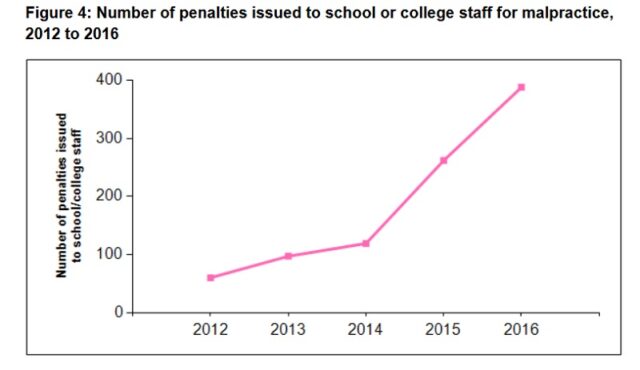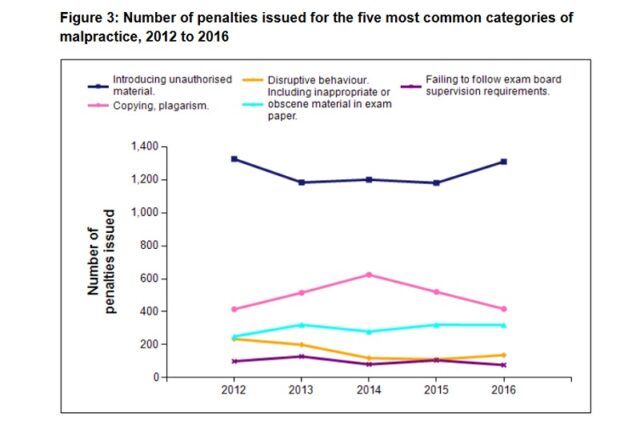The number of school staff penalised for helping students cheat in exams has risen by nearly 50 per cent, as the number of penalties issued to schools and colleges falls.
Ofqual figures published today show that 388 individual teachers or invigilators were issued penalties for malpractice during GCSEs and A-levels this year, up 48 per cent on the 262 handed out last year.
But penalties given to schools and colleges themselves fell by 41 per cent, from 288 in 2015, to 169 this year.
The figures, based on information provided by exam boards, shows that in most staff cases, penalties were issued over “inappropriate” assistance to candidates – although the report does not state what qualifies for this type of behaviour.

The majority of staff found to be cheating were given a written warning – 185 cases. This is a rise of 113 per cent compared to 2015, when just 87 were issued.
The second most common penalty was staff suspension from involvement in exams or assessment – 113 penalties in 2016, up from 91 penalties in 2015.
For pupils, a total of 2,430 penalties were issued by exam boards this year. This is one per cent fewer than the 2,460 handed out in 2015.
The penalties resulted in 1,300 loss of marks, 690 warnings, and 450 disqualifications.
Students were mostly caught cheating after using a mobile phone or other electronic device during exams – up 15 per cent from 790 last year, to 900 in 2016.
Schools and exam boards have already identified the issue of electronic devices in exams and are moving to stamp it out.
Last May, Billericay school, in Essex, banned smartwatches from exam halls to ensure students could not use them to cheat.
North Nottinghamshire college went a step further and barred students from wearing any watch during exams so they could not access the internet through a smartwatch.
Such devices are already banned by the Joint Council for Qualifications for A-levels and GCSEs.
Last year, the body issued guidance for schools that candidates should be stopped from taking “any potential technological/web-enabled sources of information” and specifically “any wristwatch that has a data storage device” into exams.

The second most common type of pupil malpractice (figure 3) was plagiarism, which is described as a failure to acknowledge sources, copying from other candidates or collusion.
Others reasons for penalties include disruptive behaviour in the exam room and inappropriate, offensive or obscene material found in their exam paper or coursework.
Overall from today’s figures, there were more than 21 million candidates who entered for exams in 2016. Ofqual said the number of penalties issued represents 0.011 per cent of entries, the same proportion as the last two summers, meaning student malpractice remains “extremely rare” across all exam boards.







Your thoughts